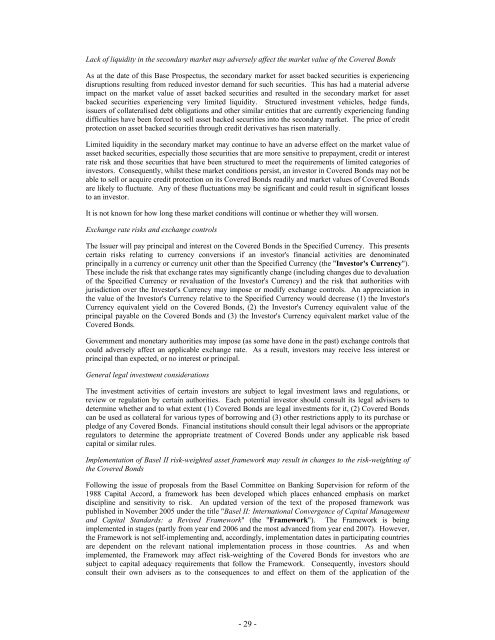MARFIN EGNATIA BANK S.A. - Irish Stock Exchange
MARFIN EGNATIA BANK S.A. - Irish Stock Exchange
MARFIN EGNATIA BANK S.A. - Irish Stock Exchange
Create successful ePaper yourself
Turn your PDF publications into a flip-book with our unique Google optimized e-Paper software.
Lack of liquidity in the secondary market may adversely affect the market value of the Covered Bonds<br />
As at the date of this Base Prospectus, the secondary market for asset backed securities is experiencing<br />
disruptions resulting from reduced investor demand for such securities. This has had a material adverse<br />
impact on the market value of asset backed securities and resulted in the secondary market for asset<br />
backed securities experiencing very limited liquidity. Structured investment vehicles, hedge funds,<br />
issuers of collateralised debt obligations and other similar entities that are currently experiencing funding<br />
difficulties have been forced to sell asset backed securities into the secondary market. The price of credit<br />
protection on asset backed securities through credit derivatives has risen materially.<br />
Limited liquidity in the secondary market may continue to have an adverse effect on the market value of<br />
asset backed securities, especially those securities that are more sensitive to prepayment, credit or interest<br />
rate risk and those securities that have been structured to meet the requirements of limited categories of<br />
investors. Consequently, whilst these market conditions persist, an investor in Covered Bonds may not be<br />
able to sell or acquire credit protection on its Covered Bonds readily and market values of Covered Bonds<br />
are likely to fluctuate. Any of these fluctuations may be significant and could result in significant losses<br />
to an investor.<br />
It is not known for how long these market conditions will continue or whether they will worsen.<br />
<strong>Exchange</strong> rate risks and exchange controls<br />
The Issuer will pay principal and interest on the Covered Bonds in the Specified Currency. This presents<br />
certain risks relating to currency conversions if an investor's financial activities are denominated<br />
principally in a currency or currency unit other than the Specified Currency (the "Investor's Currency").<br />
These include the risk that exchange rates may significantly change (including changes due to devaluation<br />
of the Specified Currency or revaluation of the Investor's Currency) and the risk that authorities with<br />
jurisdiction over the Investor's Currency may impose or modify exchange controls. An appreciation in<br />
the value of the Investor's Currency relative to the Specified Currency would decrease (1) the Investor's<br />
Currency equivalent yield on the Covered Bonds, (2) the Investor's Currency equivalent value of the<br />
principal payable on the Covered Bonds and (3) the Investor's Currency equivalent market value of the<br />
Covered Bonds.<br />
Government and monetary authorities may impose (as some have done in the past) exchange controls that<br />
could adversely affect an applicable exchange rate. As a result, investors may receive less interest or<br />
principal than expected, or no interest or principal.<br />
General legal investment considerations<br />
The investment activities of certain investors are subject to legal investment laws and regulations, or<br />
review or regulation by certain authorities. Each potential investor should consult its legal advisers to<br />
determine whether and to what extent (1) Covered Bonds are legal investments for it, (2) Covered Bonds<br />
can be used as collateral for various types of borrowing and (3) other restrictions apply to its purchase or<br />
pledge of any Covered Bonds. Financial institutions should consult their legal advisors or the appropriate<br />
regulators to determine the appropriate treatment of Covered Bonds under any applicable risk based<br />
capital or similar rules.<br />
Implementation of Basel II risk-weighted asset framework may result in changes to the risk-weighting of<br />
the Covered Bonds<br />
Following the issue of proposals from the Basel Committee on Banking Supervision for reform of the<br />
1988 Capital Accord, a framework has been developed which places enhanced emphasis on market<br />
discipline and sensitivity to risk. An updated version of the text of the proposed framework was<br />
published in November 2005 under the title "Basel II: International Convergence of Capital Management<br />
and Capital Standards: a Revised Framework" (the "Framework"). The Framework is being<br />
implemented in stages (partly from year end 2006 and the most advanced from year end 2007). However,<br />
the Framework is not self-implementing and, accordingly, implementation dates in participating countries<br />
are dependent on the relevant national implementation process in those countries. As and when<br />
implemented, the Framework may affect risk-weighting of the Covered Bonds for investors who are<br />
subject to capital adequacy requirements that follow the Framework. Consequently, investors should<br />
consult their own advisers as to the consequences to and effect on them of the application of the<br />
- 29 -

















